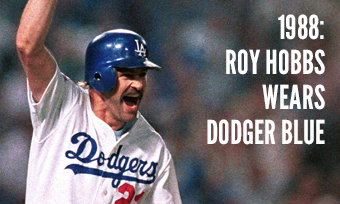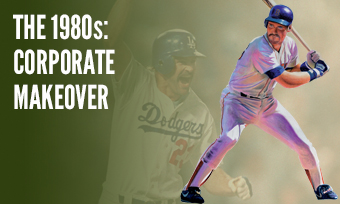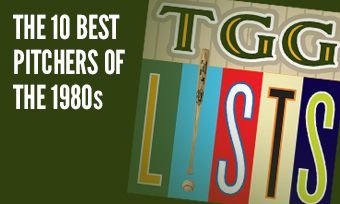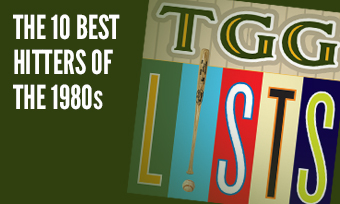The Yearly Reader
Leaders and Honors, 1988
Our list of baseball’s top 10 hitters and pitchers in both the American League and National League for the 1988 baseball season, as well as the awards and honors given to the game’s top achievers of the year.
The National League’s Top 10 Hitters, 1988
Bold type in brick red indicates league leader.
1. Will Clark, San Francisco
Key Numbers: 162 games, .282 average, 102 runs, 31 doubles, 6 triples, 29 home runs, 109 RBIs, 100 walks, 27 intentional walks.
Matching the A’s Jose Canseco on the other side of the bay in cockiness—though not his Adonis-like structure—Clark burned NL pitching with one of the sweetest swings witnessed since Stan Musial.
2. Darryl Strawberry, New York
Key Numbers: .269 average, 101 runs, 27 doubles, 39 home runs, 101 RBIs, 85 walks, 29 stolen bases, .545 slugging percentage.
“As long as I don’t slump,” the occasionally abrasive Strawberry said in spring training, “we’ll be fine.” The slugger led the NL for the only time in home runs, and the Mets won 100 games.
3. Andy Van Slyke, Pittsburgh
Key Numbers: .288 average, 101 runs, 23 doubles, 15 triples, 25 home runs, 100 RBIs, 30 stolen bases, 13 sacrifice flies.
Van Slyke showed improved muscle with the Pirates after being brainwashed with the single-and-steal philosophy at St. Louis.
4. Andres Galarraga, Montreal
Key Numbers: .302 average, 99 runs, 184 hits, 42 doubles, 8 triples, 29 home runs, 92 RBIs, 153 strikeouts, 10 hit-by-pitches, 13 stolen bases.
After hitting .305 with limited power in 1987, the young Venezuelan became a triple-crown threat at the All-Star Break, hitting .338 with 18 homers, before cooling off in the second half.
5. Kirk Gibson, Los Angeles
Key Numbers: .290 average, 106 runs, 28 doubles, 25 home runs, 76 RBIs, 31 stolen bases.
Rousing the Dodgers out of their country-club disposition, the gritty Gibson gave everything he had, right through the World Series; the post-1988 experience would be one where injuries would finally get the best of him.
6. Eric Davis, Cincinnati
Key Numbers: 135 games, .273 average, 81 runs, 26 home runs, 93 RBIs, 35 stolen bases, 3 caught stealing.
The increasingly fragile Davis overcame a rough start at the plate and on the rumor mill (with unsubstantiated claims of drug use) before righting the ship in the summer months.
7. Kevin McReynolds, New York
Key Numbers: .288 average, 82 runs, 30 doubles, 27 home runs, 99 RBIs, 21 stolen bases, 0 caught stealing.
In his second year with the Mets, the quiet McReynolds remained consistently solid and stole 21 bases without once getting caught—part of an overall streak off 33 straight successful swipes over a three-year period. He grabbed the remaining first-place MVP votes not secured by Kirk Gibson or Darryl Strawberry.
8. Bobby Bonilla, Pittsburgh
Key Numbers: .274 average, 87 runs, 32 doubles, 7 triples, 24 home runs, 100 RBIs, 85 walks.
Bonilla had a blistering start (.342 average, 13 home runs through the end of May) before tailing off—especially at Three Rivers Stadium, where he only batted .217 compared to .329 on the road. He helped cement an emerging middle of the Pirates lineup that included Andy Van Slyke and Barry Bonds.
9. Kal Daniels, Cincinnati
Key Numbers: 140 games, .291 average, 95 runs, 29 doubles, 18 home runs, 64 RBIs, 87 walks, 27 stolen bases, .397 on-base percentage.
If Eric Davis was considered Willie Mays reincarnated, Daniels might have been thought of as Eric Davis cloned; for the moment, the left-handed hitter seemed to knock the knack for hitting poorly against left-handed pitchers.
10. Brett Butler, San Francisco
Key Numbers: .287 average, 109 runs, 27 doubles, 9 triples, 6 home runs, 43 RBIs, 97 walks, 43 stolen bases.
With apologies to Rickey Henderson, Butler was certainly the most prototypical (if not effective) leadoff man currently in the game.
The American League’s Top 10 Hitters, 1988
1. Jose Canseco, Oakland
Key Numbers: .307 average, 120 runs, 187 hits, 34 doubles, 42 home runs, 124 RBIs, 10 hit-by-pitches, 40 stolen bases, .569 slugging percentage.
Unanimous choice for the AL MVP, Canseco achieved the superstardom many had expected of him and became the prototype for the well-built, well-conditioned (and chemically enhanced) slugger of the 1990s.
2. Mike Greenwell, Boston
Key Numbers: .325 average, 86 runs, 192 hits, 39 doubles, 8 triples, 22 home runs, 119 RBIs, 87 walks, 18 intentional walks, 16 stolen bases.
Upon hearing in later years that Canseco admitted to juicing, Greenwell—who showed natural mettle growing up in Florida wrestling alligators—complained that he was cheated out of the MVP.
3. Kirby Puckett, Minnesota
Key Numbers: .356 average, 657 at-bats, 109 runs, 234 hits, 42 doubles, 5 triples, 24 home runs, 121 RBIs.
Puckett set career highs in hits, batting average and RBIs, registered .406 at home and .398 against lefties, and produced eight 4-hit games to break a Twins’ record.
4. Rickey Henderson, New York
Key Numbers: .305 average, 118 runs, 169 hits, 30 doubles, 6 home runs, 50 RBIs, 82 walks, 93 stolen bases.
Rickey went back to early-career basics, shunning the power he’d developed with the Yankees and focusing on swiping bases; in 10 games, he stole at least three.
5. Dave Winfield, New York
Key Numbers: .322 average, 96 runs, 180 hits, 37 doubles, 25 home runs, 107 RBIs.
Winfield picked it up after three years of modest numbers—and before back surgery KO’d his entire 1989 season.
6. Wade Boggs, Boston
Key Numbers: .366 average, 128 runs, 214 hits, 45 doubles, 6 triples, 5 home runs, 58 RBIs, 125 walks, 18 intentional walks, 23 grounded into double plays, .476 on-base percentage.
Boggs became the first modern major leaguer to reach 200 hits in six straight years—all while being dogged in the press by his vindictive ex-mistress.
7. Dave Henderson, Oakland
Key Numbers: .304 average, 100 runs, 38 doubles, 24 home runs, 94 RBIs.
Always happy, always smiling, “Hendu” gave tremendous mental uplift and statistical support for the pennant-winning A’s.
8. George Brett, Kansas City
Key Numbers: .306 average, 90 runs, 180 hits, 42 doubles, 24 home runs, 103 RBIs, 82 walks, 14 stolen bases.
At age 35, Brett showed that if anything, he was getting better with age.
9. Fred McGriff, Toronto
Key Numbers: .282 average, 100 runs, 35 doubles, 34 home runs, 82 RBIs.
The tall left-handed slugger quietly burst upon the scene for the Blue Jays and provided the kind of statistical stability that would define his career.
10. Paul Molitor, Milwaukee
Key Numbers: .312 average, 115 runs, 190 hits, 34 doubles, 6 triples, 13 home runs, 60 RBIs, 41 stolen bases.
Though his output relatively paled to his spectacular 1987 effort, Molitor was still quite the valuable asset for the Brewers—and managed to avoid the injury bug after missing a seasonal average of over 60 games from 1984-87.
The National League’s Top 10 Pitchers, 1988
1. Orel Hershiser, Los Angeles
Key Numbers: 2.26 ERA, 23 wins, 8 losses, .742 win percentage, 1 save, 34 starts, 15 complete games, 8 shutouts, 267 innings.
After receiving little support the year before, Hershiser took matters into his own hands and made sure that opposing pitchers got no support.
2. Danny Jackson, Cincinnati
Key Numbers: 2.73 ERA, 23 wins, 8 losses, .742 win percentage, 35 starts, 15 complete games, 6 shutouts, 260.2 innings, 24 grounded into double plays.
Speaking of no support, Jackson escaped Kansas City—where he last dead last two years running in run support—and arrived in Cincinnati where he found plenty of offensive backbone from his mates. Had it not been for Hershiser’s sensational finish, the Cy Young Award most certainly would have been Jackson’s.
3. David Cone, New York
Key Numbers: 2.22 ERA, 20 wins, 3 losses, .870 win percentage, 35 appearances, 28 starts, 231.1 innings, 213 strikeouts, 10 wild pitches, 10 balks, 29 stolen bases allowed.
The Mets didn’t need more pitching, but they got it anyway from Cone, who inspired Shea Stadium fans to show up wearing ‘coneheads.’ Only the Cardinals’ Joe Magrane—who strangely finished with a 5-9 record—had a better ERA in the NL.
4. Rick Reuschel, San Francisco
Key Numbers: 3.12 ERA, 19 wins, 11 losses, 36 starts, 245 innings, 42 walks, 25 grounded into double plays.
The anti-Canseco with his dour, couch-potato posture, Reuschel thrived in his own version of 40-40—his age and his waist size.
5. John Tudor, St. Louis-Los Angeles
Key Numbers: 2.32 ERA, 10 wins, 8 losses, 30 starts, 197.2 innings, 41 walks, 23 grounded into double plays.
Traded to the Dodgers for Pedro Guerrero in August, Tudor managed to stay effective before it was learned he’d have an offseason appointment with Dr. Frank Jobe.
6. John Franco, Cincinnati
Key Numbers: 1.57 ERA, 6 wins, 6 losses, 39 saves, 3 blown saves, 70 appearances, 86 innings.
The NL’s best closer for the moment, Franco was especially dynamite in the summer months of July and August, allowing just one run over 28 appearances with 20 saves.
7. Tim Belcher, Los Angeles
Key Numbers: 2.91 ERA, 12 wins, 6 losses, 4 saves, 1 blown save, 36 appearances, 27 starts, 179.2 innings.
The 26-year-old rookie looked to be a power-pitching star on the rise; opponents batted just .217 against him.
8. Jose Rijo, Cincinnati
Key Numbers: 2.39 ERA, 13 wins, 8 losses, 2 blown saves, 49 appearances, 19 starts, 162 innings.
After mixed results in three years at Oakland, the young right-hander began a stingy stretch of six years with the Reds—certainly more mileage than they would have likely got out of Dave Parker, who went the other way in Rijo’s trade from the A’s.
9. Greg Maddux, Chicago
Key Numbers: 3.18 ERA, 18 wins, 8 losses, .692 win percentage, 34 starts, 249 innings, 16 intentional walks, 20 stolen bases allowed, 22 grounded into double plays.
A blazing start led the 22-year-old budding ace to become the youngest Cubs player to make the All-Star team; quite a turnaround for a guy who was 6-14 with a 5.61 ERA the year before.
10. Tom Browning, Cincinnati
Key Numbers: 3.41 ERA, 18 wins, 5 losses, .783 win percentage, 36 starts, 251 innings.
Besides his perfect game against the Dodgers, Browning had another no-hit bid broken up by the Padres’ Tony Gwynn with one out in ninth on June 6.
The American League’s Top 10 Pitchers, 1988
1. Frank Viola, Minnesota
Key Numbers: 2.64 ERA, 24 wins, 7 losses, .774 win percentage, 35 starts, 255.1 innings, 20 grounded into double plays.
On a Twins team that was, by the record, better than the champion edition of the year before—in part because they finally learned to win on the road—Viola firmly established himself as the team ace as only one other player (Allan Anderson) won more than 10.
2. Mark Gubicza, Kansas City
Key Numbers: 2.70 ERA, 20 wins, 8 losses, .714 win percentage, 35 starts, 269.2 innings, 23 stolen bases allowed, 24 grounded into double plays.
With Bret Saberhagen having a typical even-year downer of a season, Gubicza admirably filled in as the Royals’ ace.
3. Ted Higuera, Milwaukee
Key Numbers: 2.45 ERA, 16 wins, 9 losses, 31 starts, 227.1 innings.
So close, and yet…Higuera had the ERA crown in the bag going into the season’s final weekend—and lost it when he started and gave up three runs over six innings, leaving him just behind Allan Anderson, 2.446 to 2.454.
4. Roger Clemens, Boston
Key Numbers: 2.93 ERA, 18 wins, 12 losses, 35 starts, 14 complete games, 8 shutouts, 264 innings, 291 strikeouts, 20 stolen bases allowed.
Twelve times in 1988, a pitcher struck out 13 or more batters. Clemens was the pitcher in six of them.
5. Allan Anderson, Minnesota
Key Numbers: 2.45 ERA, 16 wins, 9 losses, 30 starts, 202.1 innings, 37 walks, 25 grounded into double plays.
The Twins had the market cornered on league-leading pitching, from the known (wins leader Frank Viola) to the unknown (ERA leader and brief wonder Anderson).
6. Greg Swindell, Cleveland
Key Numbers: 3.20 ERA, 18 wins, 14 losses, 33 starts, 242 innings, 45 walks.
In his first full year, Swindell became the first Cleveland pitcher since Stan Coveleski (in 1920) to win his first six starts to the season; he overcame an eight-game losing streak in mid-summer to finish strong.
7. Dave Stewart, Oakland
Key Numbers: 3.32 ERA, 21 wins, 12 losses, 37 starts, 14 complete games, 275.2 innings, 110 walks, 14 wild pitches, 16 balks.
The early-season balkmania from umpires who were told to get strict with the rule impacted Stewart the most, committing 11 of his record 16 balks in just his first six starts before the arbiters laid off. It didn’t keep him from winning 20-plus games for the second of four straight years.
8. Dave Stieb, Toronto
Key Numbers: 3.04 ERA, 16 wins, 8 losses, 31 starts, 207.1 innings, 13 hit-by-pitches, 20 stolen bases allowed.
There was a bright side to Stieb’s back-to-back no-hit bids, each broken up with two outs in the ninth: Those two games were part of a career-high 31.2-inning streak of consecutive scoreless innings.
9. Dennis Eckersley, Oakland
Key Numbers: 2.35 ERA, 4 wins, 2 losses, 45 saves, 8 blown saves, 60 appearances, 72.2 innings, 11 walks.
Other starters had been converted to closers before, but no one did it as brilliantly as Eckersley—and it took opponents a little getting used to, as he didn’t allow a single run over his first 15 innings thrown.
10. Jeff Robinson, Detroit
Key Numbers: 2.98 ERA, 13 wins, 6 losses, 23 starts, 172 innings.
On a five-man Detroit staff of familiar names (Jack Morris, Doyle Alexander, Frank Tanana), the unfamiliar Robinson shined as the most efficient. This, from a guy whose career ERA outside of 1988 was 5.37.









